
“I’ve always wanted to teach because I enjoy helping people, especially kids” said Taylor Dunham. “I like helping them look past the challenges they face and to realize they can do anything they set their minds to.”
Thanks in large part to the support she received as a North Carolina Teaching Fellow, Ms. Dunham’s dreams are on the verge of coming true. On May 12, 2019, she graduated from UNC-Chapel Hill with a Master of Arts in Teaching, and now she’s eager to begin her service in a special education classroom.
Now that Ms. Dunham and some of her peers have finished their studies and are transitioning from pre-service students to in-service teachers, members of the 2019 cohort are getting set to take their place in the UNC System.
Jana Hunter is one of 133 finalists offered an NC Teaching Fellows award. In the fall, as Ms. Dunham begins to teach, Ms. Hunter will begin preparing for a future career in a North Carolina classroom.
The mission of the North Carolina Teaching Fellows Program is to recruit and prepare the state’s most promising students to teach in a STEM or a special education area and to serve high-need schools. Together, Dunham and Hunter embody precisely what North Carolina’s K-12 education needs most: teachers who are excited by the challenge of helping students to see beyond the obvious.
“This is an exciting time to be involved with something so important to North Carolina,” said Sara Ulm, director of the North Carolina Teaching Fellows Program. “We get to watch the energy coming into the program and the remarkable talent at the other end, eager and ready to make a difference. The process exemplifies how the NC Teaching Fellows Program is already having an impact as it enters its third year since being reestablished.”
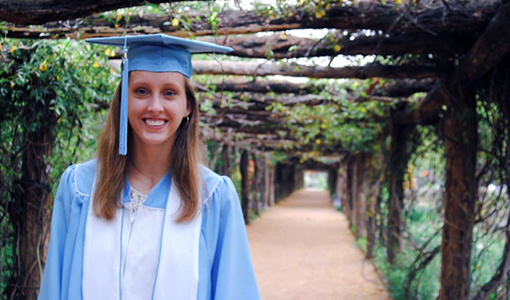
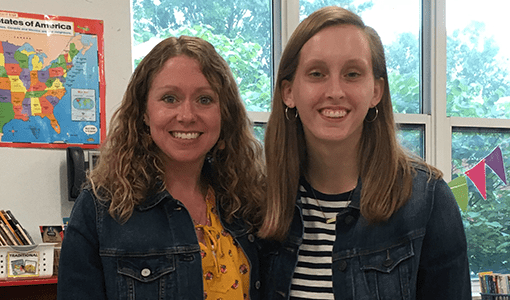
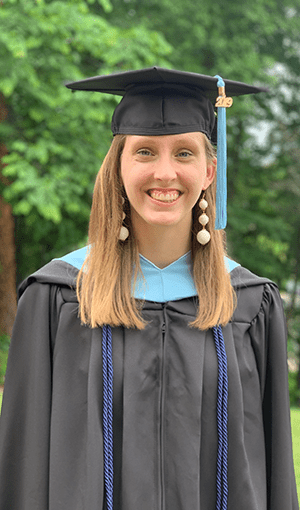
Empathy Between the Lines
When Ms. Dunham anticipates the first year of her new career, she is most excited about the prospect of building a classroom library.
“I love reading and my elementary school teachers really inspired me to be passionate about books, and I want to pass that energy on,” she said. “I want to inspire that same love, so that my students see reading not as a task they have to do, but something that is useful, whether that is reading a math problem, or a street sign, or just reading for fun.”
By her estimation, Dr. Seuss’s The Lorax might be one of the first books she pulls off the shelf to share with her young audience.
For readers young and old, a mere mention of The Lorax probably conjures up memories of the unsavory Once-ler—the ambitious but short-sighted entrepreneur who lays waste to the environment in his pursuit of riches. When Taylor Dunham reads the Once-ler’s tale, she doesn’t see a character who is evil or unlikeable. She sees something much more nuanced: a character who has learned from his mistakes.
She certainly recognizes the theme of environmental justice in the classic piece of children’s literature, and she also sees the book’s possibilities as a platform for teaching basic economics. But she’s mostly interested in The Lorax as a story that teaches the value of empathy.
“I like using the book to talk about point of view and to explore whether or not The Once-ler is actually a good character,” she explains. “He’s not just a mean person for destroying the environment. Actually, the ending is so powerful because you understand that he is full of regret, and he’s using what he’s learned from experience to influence the boy who is listening to the Once-ler’s story.”
The best teachers ‘think outside the box’ and encourage their students to do the same. If Ms. Dunham’s complex reading of The Lorax is any indication, her lesson plans will be far from formulaic.
Perhaps even more tellingly, her capacity for responding empathetically to such a challenging character reveals a quality any teacher needs if she wants to reach the students in the room: compassion.
Elements of the NC Teaching Fellows Program helped Dunham tap into this quality.
“The professional development workshops have helped me see the importance of relationship-building skills. I never thought about that as a fundamental element of teaching before,” she explained. “But the more I talked with teachers in the field, the more I heard that the number one question is, can you build relationships with all your students? Do you understand where they are coming from and what their background knowledge is?
“These are the issues that impact teaching going forward, and this is something I never realized until I became a Teaching Fellow,” she reiterated.
In the spirit of this realization, Dunham anticipates carving out a few minutes at the beginning of each day to connect with her students—to stop and ask what they are interested in and excited about.
“I want each one to see me as someone who actually cares about them as a person instead of just a student.”
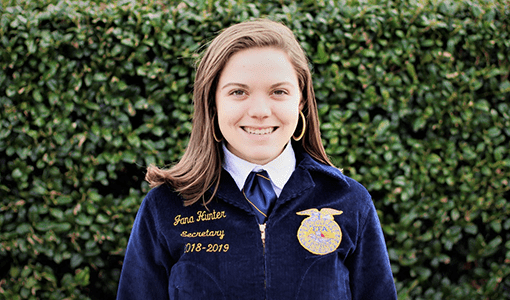

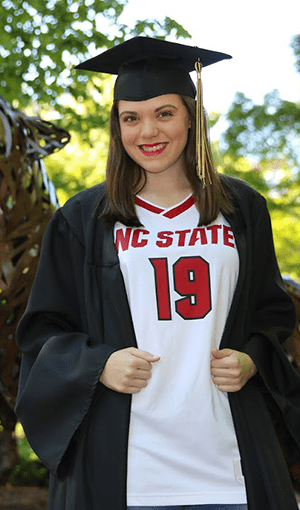
Recruiting Passion
This capacity for empathy is critical in any classroom. Taking the time to work with students as individuals and not just as members of a class can change a life … just ask Jana Hunter.
As a member of the 2019 Teaching Fellows cohort, Hunter bubbles with enthusiasm when she begins talking about her plans to study at NC State so she can eventually teach agriculture. Three years ago, she was a die-hard Carolina fan dead set on doing anything besides teaching for a career. What changed her mind? Teachers who recognized something special in her.
Hunter grew up in Salemburg, a tiny town (population 435) in Sampson County, NC. Surrounded by farmland her whole life and raised by two educator parents, Hunter was sure of one thing about her future: she knew she would pursue a lucrative career path that would get her out of the sticks.
In her sophomore year in high school, funding for the pre-calculus course she’d registered to take fell through. Her advisor encouraged her to take the one honors class that was available: Horticulture One.
“Me? With the farm boys and their big loud trucks? I don’t think so!” she thought at the time.
But she arrived on the first day of class, and, before she knew it, her hands were knuckle-deep in soil, transplanting seedlings.
“I remember wearing a super nice outfit, and there I was, covered in dirt. But I didn’t care, because I loved it. I came home, and my parents were shocked because they’d barely seen me in a field and had never known me to be excited about farming,” she said.
When her teacher spotted her enthusiasm, he began encouraging her to get involved with the local FFA (Future Farmers of America) chapter. She became an active member on its Parliamentary Procedures Team. Soon, she was serving as president of the team. Even more shockingly, she began attending conferences at NC State—a campus she found herself falling in love with, despite her Tarheel inclinations.
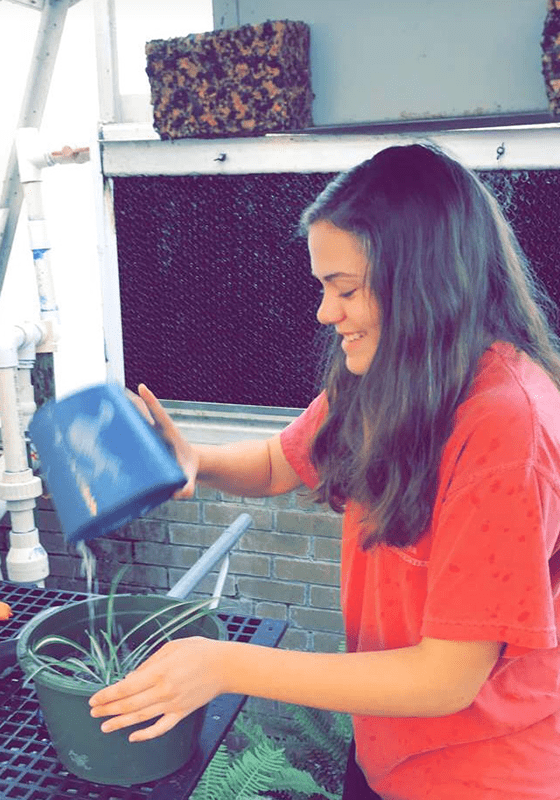
Then, she started to reconsider her refusal to enter the teaching profession.
“Having parents as teachers had pushed me away from education. You know, there’s the pay issue, and people talk about how kids don’t treat teachers with respect,” she explained. “I always thought I was going to do something different that would make more money. Then I got involved with the FFA, and I saw the impact teachers had had on me. That made me realize how important their job is.”
Even though she’d never envisioned herself a teacher, she started to realize that she had actually enjoyed working with kids her entire life. She had tutored. She had taught dance at a studio. She had come home from school every day and shared what she’d learned with her little brother and a cousin.
She had even founded and organized the Little Miss Lakewood Beauty Pageant at her former elementary school, just to raise money for a local food pantry. (To date, her efforts have raised $10,000 through entry fees and contestant sponsorships, and 100 percent of that money goes to the organization.)
“I had to come to terms with the fact that I’ve spent my whole life teaching and helping others. I went through a period of self-reflection, and I realized how my teachers and my classroom experiences had influenced me. It made me realize that I want to have that impact on kids one day,” she mused.
The Greenhouse and the Classroom: What it Takes to Thrive
Like Dunham, when Hunter enters her own classroom one day, she will take the time to nurture each individual.
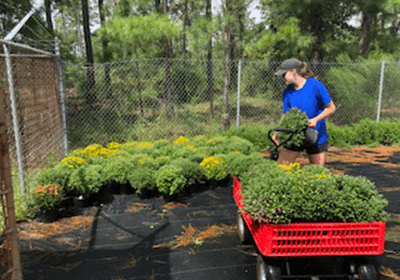
“Not surprisingly, I compare teaching to horticulture. Let’s say you have ten lantana plants in the same greenhouse,” she imagined. “Seven are thriving, but the leaves are falling off of three. What’s going on? You’ve put the same amount of fertilizer on all of them. Watered them the same amount. They’re all growing in the same conditions. Even though each of those plants is the same species, each is its own entity.
“That’s exactly how students are,” Hunter continued. “Every student has different strengths. Every student has different things they need. As a teacher, it’s my job to adjust my teaching style and make modifications to make them as successful as they can be. All individuals need that kind of attention if they are going to grow into successful students or, in the greenhouse, into successful plants.
Although they are in different stages of their budding careers, it’s clear that Dunham and Hunter will bring vitality and passion to K-12 education.
And yet, had the state not offered the support of a Teaching Fellows award, North Carolina might’ve lost the opportunity to get either one of them in front of students.
After graduating with a BA in English Literature from UNC-Chapel Hill, Dunham knew she’d have to return to graduate school to fulfill her lifelong dream to teach. But she is a triplet with two other siblings who had also needed parental support to finance undergraduate education. Teaching Fellows is what made her master’s work financially feasible.
More than that, the Fellowship sparked her interest in working with students with disabilities. Teaching Fellows programming in resource classrooms exposed her to the field of special education. Soon she realized that she liked the intimacy of the smaller classroom. She liked helping the students find their intellectual strengths and succeed academically.
“The program pushed me to think about education in a new way and helped me to understand where I fit in the classroom,” she explained.
In Hunter’s case, shortly before she was offered her Teaching Fellows award, a doorway to a whole other opportunity opened before her. She learned that she had been accepted into East Carolina University’s Early Assurance Program for physical therapy. Upon completing her bachelor’s degree, she would have had guaranteed slot in ECU’s physical therapy school.
“That was a huge deal, because I’d spent so much time thinking I wanted to do something different. It was hard to turn down,” she said. “But I’d done that self-reflection and spent enough time on State’s campus to fall in love with that community. By the time the Teaching Fellows award landed in my hands, there was no doubt. It was all too perfect for me to pass up.”
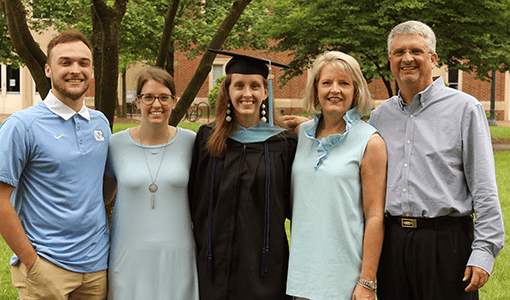
Lessons Learned, from Generation to Generation
As a result of teachers who cared, Jana Hunter’s mind expanded considerably when she was a sophomore in high school. Now she can think of nothing better for North Carolina than sharing her enthusiasm.
“I want students to be excited about agriculture,” she beamed. “I want people to see that agriculture isn’t just about farmers in rural areas. Agriculturalists are teachers, and they are scientists, and they are politicians, and they are lawyers, and so much more.”
Brilliant teachers ignited Hunter’s passion for agriculture. The North Carolina Teaching Fellows Program has ensured that she has the support she needs to pass that passion down to the next generation.
“Whenever National Teach Ag Day comes around, I always send the teachers who influenced me a text. I want to let them know how much I appreciate them,” she said. “But I honestly don’t think there are any words I could use to thank my teachers. The best expression of gratitude I can think of is to be as influential an educator as they had been for me.”